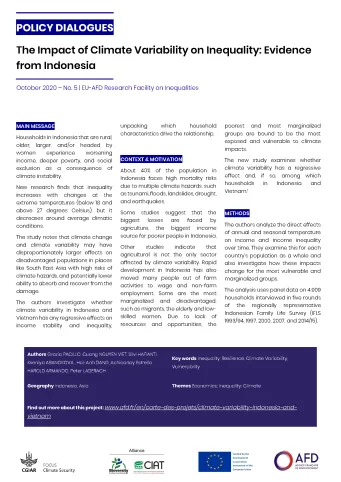Share the page
The Impact of Climate Variability on Inequality: Evidence from Indonesia
Published on

Households in Indonesia that are rural, older, larger, and/or headed by women experience worsening income, deeper poverty, and social exclusion as a consequence of climate instability.
New research finds that inequality increases with changes at the extreme temperatures (below 18 and above 27 degrees Celsius), but it decreases around average climatic conditions.
The study notes that climate change and climate variability may have disproportionately larger effects on disadvantaged populations in places like South East Asia with high risks of climate hazards, and potentially lower ability to absorb and recover from the damage.
The authors investigate whether climate variability in Indonesia and Vietnam has any regressive effects on income stability and inequality, unpacking which household characteristics drive the relationship.
Useful Information
-
Authors
-
Grazia PACILLO, Cuong NGUYEN VIET, Silvi HAFIANTI, Kseniya ABANOKOVA, Hai-Anh DANG, Achicanoy Estrella HAROLD ARMANDO, Peter LADERACH
-
Coordinators
-
Edition
-
5
-
Number of pages
-
2
-
eISSN
-
in process
-
Collection
-
Policy Dialogues
